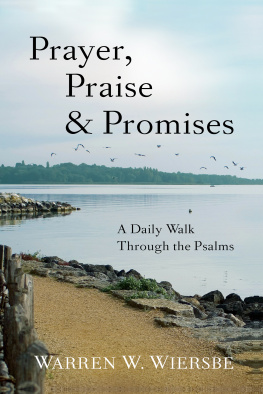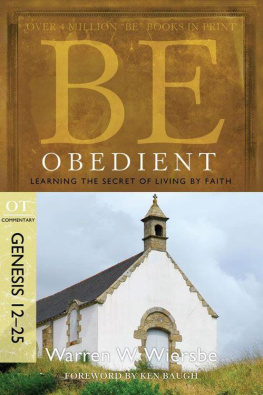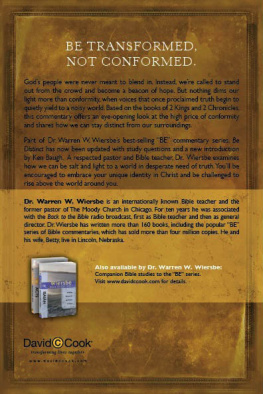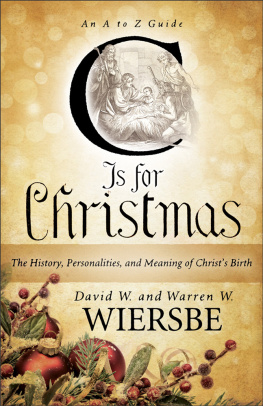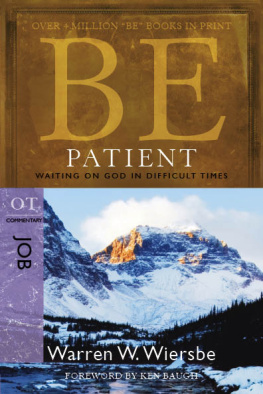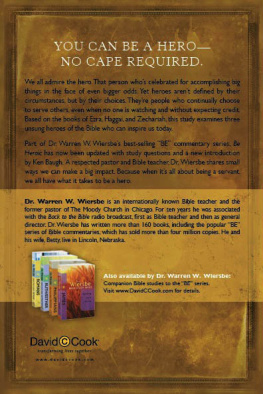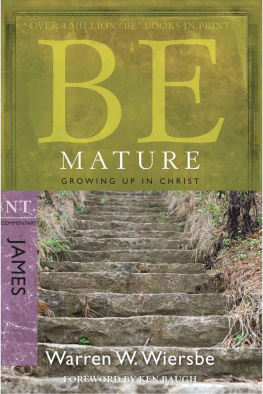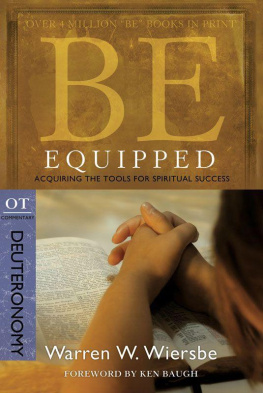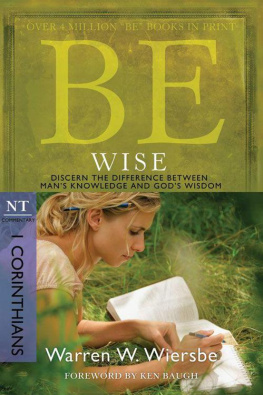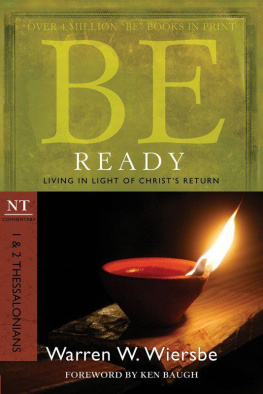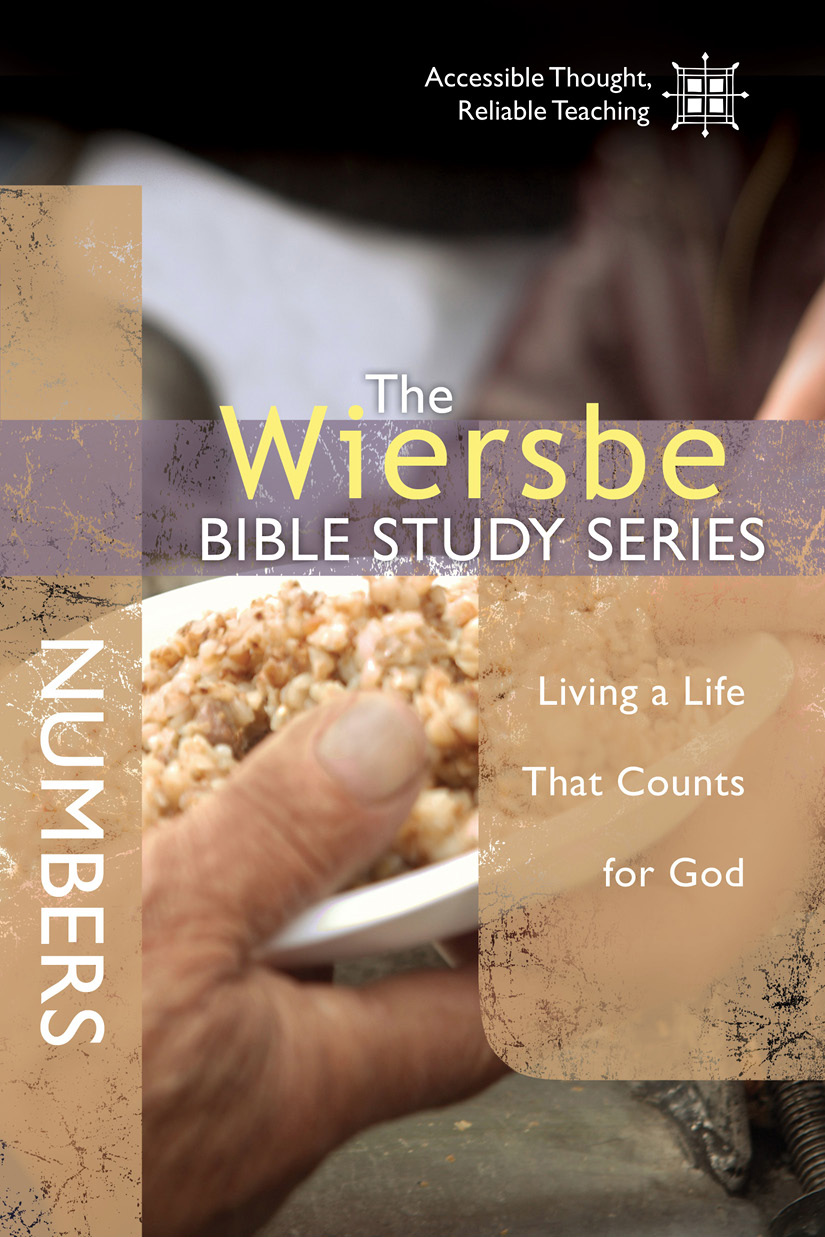Introduction to Numbers
The Importance of Being Counted
In different parts of the world, the word count shows up with assorted meanings. Count us out! is what American teenagers say when they have their own plans for the day. (Include us out is a variation of this phrase.) To a fight fan, counted out means that the boxer is on his back in the ring and has lost the fight.
But perhaps the most familiar use of the word count is as a synonym for dependability: You can count on me! It may have a military origin. Once soldiers are in position and have counted off, theyre ready to hear and obey their officers orders. This is the way Im using count in this book. To be counted means to be the kind of Christian God can depend on to get the job done right.
More Than Conquerors
The book of Numbers opens with a count of all the fighting men in the camp. They were counted, but they couldnt be counted on, so all but two of them died during Israels march through the wilderness. Then the new generation was counted, and they were people whom the Lord could count on. They trusted His Word, entered the Promised Land, and claimed it for their inheritance.
Studying the book of Numbers can help us better understand how God directs His people, why being faithful to Him is important, and how we can grow spiritually in the difficulties of life. We dont have to fail as did that first generation; we can be more than conquerors through him who loved us (Rom. 8:37).
Warren W. Wiersbe
Contents

THE WIERSBE BIBLE STUDY SERIES: NUMBERS
Published by David C Cook
4050 Lee Vance View
Colorado Springs, CO 80918 U.S.A.
David C Cook Distribution Canada
55 Woodslee Avenue, Paris, Ontario, Canada N3L 3E5
David C Cook U.K., Kingsway Communications
Eastbourne, East Sussex BN23 6NT, England
The graphic circle C logo is a registered trademark of David C Cook.
All rights reserved. No part of this ebook may be reproduced, scanned, resold, or distributed by or through any print or electronic medium without written permission from the publisher. This ebook is licensed solely for the personal and noncommercial use of the original authorized purchaser, subject to the terms of use under which it was purchased. Please do not participate in or encourage piracy of copyrighted materials in violation of the authors rights.
All Scripture quotations in this study are taken from The Holy Bible, New International Version, NIV Copyright 1973, 1978, 1984, 2011 by Biblica, Inc. Used by permission. All rights reserved worldwide.
In the Be Counted excerpts, unless otherwise noted, all Scripture quotations are taken from the King James Version of the Bible. (Public Domain.) Scripture quotations marked NIV are taken from the Holy Bible, New International Version. NIV. Copyright 1973, 1978, 1984 International Bible Society. Used by permission of Zondervan. All rights reserved; NKJV are taken from the New King James Version. Copyright 1982 by Thomas Nelson, Inc. Used by permission. All rights reserved; NLT are taken from the New Living Translation of the Holy Bible. New Living Translation copyright 1996, 2004 by Tyndale Charitable Trust. Used by permission of Tyndale House Publishers; and ASV are from The American Standard Version. (Public Domain.)
All excerpts taken from Be Counted , second edition, published by David C Cook in 2010 1999 Warren W. Wiersbe, ISBN 978-1-4347-6498-0.
LCCN 2013950191
ISBN 978-1-4347-0693-5
eISBN 978-1-4347-0747-5
2013 Warren W. Wiersbe
The Team: Steve Parolini, Karen Lee-Thorp, Amy Konyndyk, Nick Lee, Tonya Osterhouse, Karen Athen
Series Cover Design: John Hamilton Design
Cover Photo: iStockphoto
First Edition 2013
An internationally renowned Bible teacher, Dr. Warren W. Wiersbe has written more than 160 books, including the popular BE series of Bible commentaries. He and his wife, Betty, live in Lincoln, Nebraska.
Visit DCCeBooks.com for more great reads.

How to Use This Study
This study is designed for both individual and small-group use. Weve divided it into eight lessonseach references one or more chapters in Warren W. Wiersbes commentary Be Counted (second edition, David C Cook, 2010). While reading Be Counted is not a prerequisite for going through this study, the additional insights and background Wiersbe offers can greatly enhance your study experience.
The Getting Started questions at the beginning of each lesson offer you an opportunity to record your first thoughts and reactions to the study text. This is an important step in the study process as those first impressions often include clues about what it is your heart is longing to discover.
The bulk of the study is found in the Going Deeper questions. These dive into the Bible text and, along with helpful excerpts from Wiersbes commentary, help you examine not only the original context and meaning of the verses but also modern application.
Looking Inward narrows the focus down to your personal story. These intimate questions can be a bit uncomfortable at times, but dont shy away from honesty here. This is where you are asked to stand before the mirror of Gods Word and look closely at what you see. Its the place to take a good look at yourself in light of the lesson and search for ways in which you can grow in faith.
Going Forward is the place where you can commit to paper those things you want or need to do in order to better live out the discoveries you made in the Looking Inward section. Dont skip or skim through this. Take the time to really consider what practical steps you might take to move closer to Christ. Then share your thoughts with a trusted friend who can act as an encourager and accountability partner.
Finally, there is a brief Seeking Help section to close the lesson. This is a reminder for you to invite God into your spiritual-growth process. If you choose to write out a prayer in this section, come back to it as you work through the lesson and continue to seek the Holy Spirits guidance as you discover Gods will for your life.
Tips for Small Groups
A small group is a dynamic thing. One week it might seem like a group of close-knit friends. The next it might seem more like a group of uncomfortable strangers. A small-group leaders role is to read these subtle changes and adjust the tone of the discussion accordingly.
Small groups need to be safe places for people to talk openly. It is through shared wrestling with difficult life issues that some of the greatest personal growth is discovered. But in order for the group to feel safe, participants need to know its okay not to share sometimes. Always invite honest disclosure, but never force someone to speak if he or she isnt comfortable doing so. (A savvy leader will follow up later with a group member who isnt comfortable sharing in a group setting to see if a one-on-one discussion is more appropriate.)
Have volunteers take turns reading excerpts from Scripture or from the commentary. The more each person is involved even in the mundane tasks, the more theyll feel comfortable opening up in more meaningful ways.
The leader should watch the clock and keep the discussion moving. Sometimes there may be more Going Deeper questions than your group can cover in your available time. If youve had a fruitful discussion, its okay to move on without finishing everything. And if you think the group is getting bogged down on a question or has taken off on a tangent, you can simply say, Lets go on to question 5. Be sure to save at least ten to fifteen minutes for the Going Forward questions.


